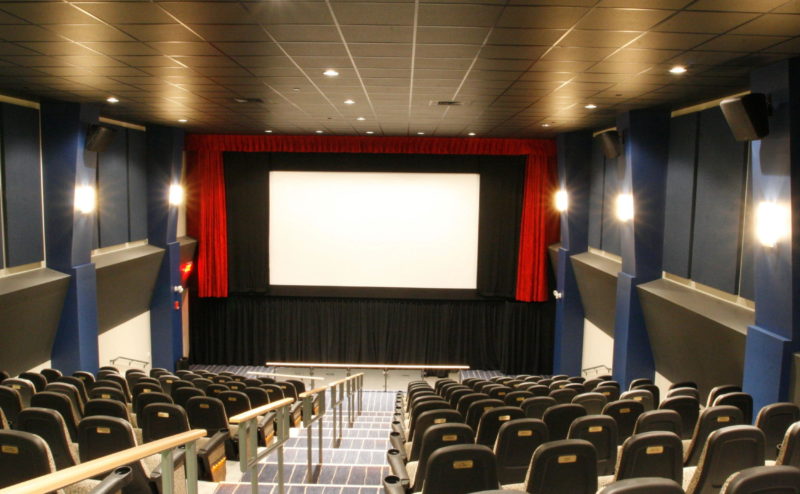
Company/Organization Profiles | New Hampshire | Theatres
Theatre Revival
Written by David Pierotti | Posted by: NewEnglandFilm.com
Like a species brought back from the brink of extinction, the American independent movie theatre is experiencing something of a comeback. Suburban multiplexes effectively wiped out most smaller movie houses but here and there passionate film lovers and plucky entrepreneurs are rebutting conventional economic wisdom. A great example of this is the Red River Theatres in Concord, NH, which opened in October of 2007 to enthusiastic community support.
When Barry Steelman’s Cinema 93 closed in 1998, it was assumed that he was simply the latest owner to fall prey to the national chains. (The town’s other indie venue, the Concord Theatre, closed its doors in the mid-90s.) But in 2000, Steelman, and a committed group of volunteers, began planning a comeback. Seven years and one significant renovation later, the Red River Theatres sold its first bag of popcorn and is one of the anchors to Concord’s Main Street revitalization project.
But first came an arduous planning and fundraising process. Thankfully the city of Concord offered support by funding a study that suggested the theatre could provide a broad-based economic stimulus to the area. Now, Red River is nearing completion of its $1.8 million capital campaign.
The three-screen venue is located on the lower two levels at 11 South Main Street, in the heart of Concord. The lobby features an appealing combination of classic theatre décor and unique architectural and design elements. The largest theatre seats 160, projects 35mm, and boasts Dolby surround sound. The second theatre seats 113 (and like the first, can accommodate other types of performance) and the third — a DVD screening room — seats 48.
Much of the capital was raised from local businesses as well as individuals. For instance, Stonyfield Farms, in nearby Londonderry, NH, purchased the naming rights to one of the theatres. But individuals have also been an important source of support. For a limited time, individuals can have names inscribed on a seat, or purchase a star that is hung in the lobby along the wall for donations between $500-2,500.
Red River’s strategy is to present independent films that appeal to a broad audience. “I want films that do two things,” executive director Robbi Farschman explains. “I want them to meet our mission, so that they are quality art-house films, foreign films, documentaries or local films. And there is also a need for a consistent revenue stream. So there is that balancing act.” So far the response has been very positive, on a recent weekend the theatre posted one of the highest per screen grosses for Into the Wild in New England.
Even as the cost of film production decreases, exhibition remains a challenge for young filmmakers, which is why Red River created a screening room and equipped it with a Blu-Ray DVD projection player. According to Farschman, “This intent is to help launch New England filmmakers and give them a venue to show their projects.” The room is available for rent or filmmakers may submit their projects to the theatre. Farschman watches two or three screeners submitted by new filmmakers each week.
Red River has also given a permanent home to the Somewhat North of Boston (SNOB) Film Festival, which celebrated its sixth year this past November. Previously, screenings were scattered throughout Concord but now the festival will be consolidated at Red River. This is expected to help continue the growth of the festival, because as Farschman says, “Those films are perfectly suited for our smaller screening room.” Additionally, the theatre will host the Short Short Story Film Festival in November 2008, which will exclusively feature films less than five minutes in length. (Toni Pennacchia and Paul Elsnau of the RI-based MergingArts Productions coordinate the festival.)
However, Red River is not content merely to show films. Farschman envisions the theatre as an important community resource, which is part of what attracted her to the position. “I’m interested in the opportunity to use the theatre as a building block within the community, to use film as more than just a passive experience. I want to find a way to make it more thought provoking… and also create activities around film, like Q&A sessions with directors and writers.”
Farschman has begun several innovative programs, such as using films to stimulate community-based discussions. For instance, she recently screened Dark Days, a documentary on homelessness, and had social workers familiar with the topic speak to the audience afterwards. She also hopes to integrate film screenings with local academic curriculum. If students were studying the Civil War, perhaps, they could watch Glory, or if they were reading To Kill a Mockingbird in class, Red River could arrange to show the film version. She has also turned available wall space in the lobby of the theatre into an art gallery. Currently, it features works by local high school students and in the future will display art from New Hampshire artists.
It remains to be seen whether this type of community-based resource can remain economically viable in Concord. Film lovers, independent filmmakers, and anyone concerned with the health of their community certainly hope so. If it does, there is every reason to believe it could become a model for other cities and towns. But for the time being, the Red River Theatre is an example of an endangered species on the rebound.
More information on the theatre, including the schedule of films and events, and membership details, can be found at www.redrivertheatres.org.









